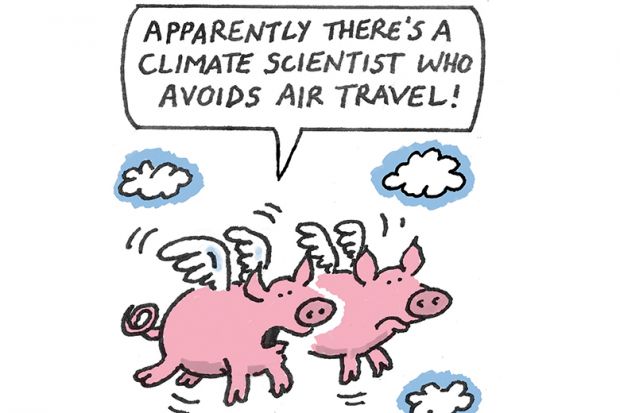
Are climate change scientists full of hot air? A new study, drawing on an international survey of more than 1,400 academics, has found that climate experts fly more than other researchers, taking a total of five flights a year on average – one domestic, two intracontinental and two intercontinental – compared with the four, on average, taken by those not specialising in climate change (two intracontinental and two intercontinental). However, the research from scholars at Cardiff University found that climate researchers also report higher levels of awareness of and concern about the impact of aviation on climate change, and as such they were more likely to offset their flights, use alternative modes of travel or avoid travel. The authors of the paper said that their extra air travel was, in some ways, expected given the discipline’s global focus and the need to conduct fieldwork.
Rumblings of discontent at the Royal College of Physicians have grown louder, with more than 400 members up in arms over the college’s plan to sell some of its unique treasures to cover a £3 million gap in its finances, according to The Times. Fellows and members signed a letter stating that any auction of rare books would amount to a “serious dereliction of duty”. The books, which were donated to the college more than 300 years ago, include the first book printed in English as well as a psalter owned by John Dee, an astronomer and codebreaker to Elizabeth I. The letter, which was leaked to The Times, said: “[The proposed sale] would be a signal that the college does not honour its place amongst the great national institutions of the UK, nor amongst the international academic community. Most importantly, it would represent a breach of trust between the public, the benefactors, and the college.”
Those living in the hope that UK students have been taking a more sensible approach to socialising during the pandemic since freshers’ week will be disappointed by the latest reports from campuses. Four third-year students at Nottingham Trent University, which is in tier two, were fined £10,000 each after hosting a party with more than 30 people, the BBC reported. When challenged, the organisers, who have been suspended by the institution, told police that they were “spoiling their fun” and complained that they should be having the “time of their lives”. Meanwhile, more worryingly, video footage captured University of Salford students jumping from a residence hall after security were alerted to a gathering in student accommodation, according to the Manchester Evening News. Numerous students climbed through the windows of a first-floor flat in a bid to escape, with some being helped down by their peers while others jumped without aid.
With coronavirus thoroughly dominating the news agenda, not to mention most people’s lives in general, it can sometimes be easy to forget that there are, in fact, other things going on. And that goes for scientists too, according to Sir Peter Ratcliffe, winner of the 2019 Nobel prize for medicine, who went on to compare scientists to the world’s greatest footballer, Lionel Messi. He said there was “a belief in some quarters that the whole world of science should stop what it’s doing and work on coronavirus”. But, he said, investigators need to believe “they can solve a particular problem” and that the best research is “passion driven” – much like Messi’s desire to leave defenders in his wake via mesmeric dribbling and precision passing. “Messi would play football regardless of how much he is paid. That’s what you’re harnessing in science; it’s that human passion that some people have to push themselves and find things out,” Sir Peter told Times Higher Education.
Members of University College Cork’s law society were stunned to silence during a recent debating contest on Zoom. The reason? Unfortunately, not an exquisite rhetorical flourish or a powerful rebuttal but, rather more alarmingly, videos of naked and masturbating men appearing on screen. “Everyone stayed on the call for what now seems too long, I think because we were all so shocked by it,” someone on the call told The Times. The competition’s speaker tried to restart the debate but the call was hijacked again and was subsequently moved to a new secure online meeting room. The university said that it has “provided advice on the use of video collaboration platforms along with online community guidelines that aim to provide a safe space for all participants” and will “use any findings from this incident to improve our IT security awareness sessions”.